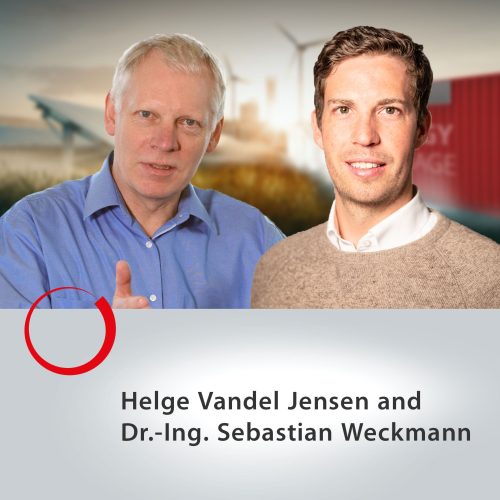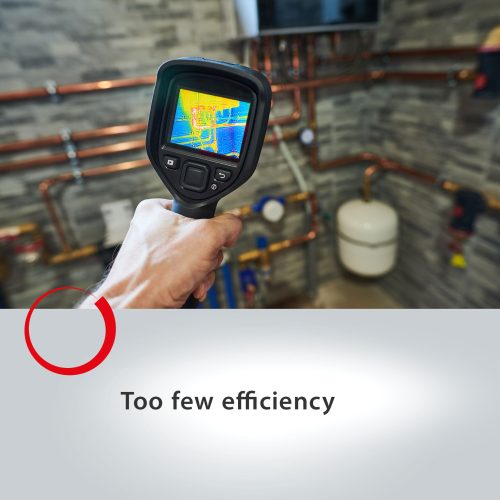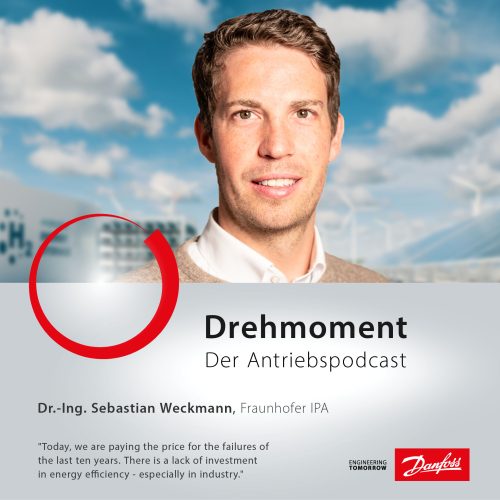Energy crisis - incentive for more efficiency?
What the industry can do now
Episode 2/4
Energy crisis: A question of efficiency?
The industry stares spellbound at the current gas supply situation in the country. Information about the filling level of the gas storage tanks is particularly in demand. So far, too few companies are looking at measures they can implement themselves to secure their energy supply. But this is exactly where a lot can be done to get out of gas dependency. We spoke with Dr. Sebastian Weckmann from the Fraunhofer Institute for Manufacturing Engineering and Automation IPA and Helge Vandel Jensen from Danfoss Drives about the energy supply of today and tomorrow. Listen to the second episode of the podcast season "Energy crisis – incentive to increase our efficiency?" or read the interview with the two experts on this page. Did you miss an episode? Click here for the season overview of Torque – The Drive Podcast Danfoss Drives Torque – The Drive Podcast.
In an interview on the energy crisis: "The energy issue will never leave us."

Is the cold gas withdrawal coming? Where do we go from here, what should we do now?
Jensen: I think we need to think more and more about other solutions for energy supply to industry and focus more on measures for greater energy efficiency. Because although many industries and also many private consumers have invested in energy-saving measures, I think there is still a lot of potential. And this applies to buildings as well as industrial processes. So the next step we need to take is to really look at energy efficiency and optimize our industrial processes around that.
That is, Danfoss sells more frequency converters …
Jensen, laughing: "I would like to sell more frequency converters, because users can save energy significantly with them. But there are also a lot of other efficiency optimizations that can be implemented in plants. Lost heat is a big issue: we should work harder to use it for other processes.
Weckmann: Heat loss is an important building block for greater efficiency and lower energy consumption. Using waste heat is the right way to go in industry. I see it the same way as Helge: There is a huge potential here that is still dormant in the industry. But of course also in all other sectors, such as transport and buildings. The expansion of district heating and the close integration of industry and society is a good step in the right direction.
Have we forgotten about energy efficiency for years?
Weckmann: ‘Forgetting’ is not the right word. I would say we have neglected them. If you look at the investments in the energy transition, a large part of the money simply flows into the expansion of renewable energies or into the grid infrastructure. Only a very small proportion actually flows into investments in energy efficiency, especially in industry. In my opinion, this is a very important aspect and we are paying the price for the failures of the last 10 years today.
For years, Danfoss has been explaining to the market the benefits of energy-efficient applications and processes. It begs the question: didn’t the industry want to hear it?
Jensen: I think it’s more to do with the fact that energy prices weren’t that particularly high. That has now changed very quickly, and for all of us it is quite clear: We must now act and readjust. Of course, most companies want their energy efficiency investments to pay off in one or two years, but I personally think a three-year span is also a good thing.

How energy-efficient is production at Danfoss?
Jensen: We also took another look at all our areas internally. Result: We have managed to reduce our energy consumption by an additional 30 percent. What we have optimized, for example, is our water supply. We used to supply our plants with 140-degree water. Then we found that it is very, very rare that we need this high temperature. We then changed that. Where we don’t need high temperatures, we now run at 70 degrees. We also have an in-house district heating system at our Danish headquarters, which is connected to the public district heating system. Then we also optimized our whole ventilation system for the factories. And from our internal data center, we use the lost heat for the district heating network.
Mr. Weckmann, has energy efficiency reached the boardroom?

Weckmann: Well, the topic of energy has picked up speed in the last three years in particular. Actually, from the time when students stopped going to school on Fridays and went to the streets to demonstrate. There has been a tremendous amount of social pressure. This has led to a change in corporate thinking. Added to this are the extreme increases in energy prices. You have to keep in mind that many companies are not even in a position to pass on rising energy costs to their customers on a one-to-one basis. At the moment, they are primarily reducing their profit margin. All this means that the topic is now very present in companies. There are, of course, companies that have been dealing with the issue of energy efficiency for a very, very long time and are also very good at optimizing their processes. These companies usually have a high proportion of energy costs in their cost mix. However, there are also companies that have perhaps been dealing with the issue for some time but have not yet taken any binding steps because they have not pushed energy costs that much so far. What is needed now is more commitment to energy efficiency in these companies. You need to take action and implement it. Of course, it’s perfectly clear that this also poses major challenges for companies.
Are people ready to spend money now?
Weckmann: Yes, I would say so. Companies are willing to spend money for more efficiency. On the other hand, we are also in a crisis situation right now, and this also involves a certain degree of risk restraint – a kind of hedging strategy. But we are also finding that many companies are actually prepared to make strategic investments now in order to be in a better position tomorrow. Their main concern is to become even better in the future. Because one thing is clear: the topic will not let us go. It will be with us now, probably forever.
As always, you can hear the complete conversation in the Torque drive podcast from Danfoss Drives.
Energy crisis - incentive for more efficiency?
All episodes of the podcast season at a glance
In the podcast season "Energy crisis – incentive for more efficiency?" we go on an energy efficiency journey – from green hydrogen to storage technologies and DC supply in industry. For this, we have invited a lot of energy experts. They explain how the industry must position itself technologically for the next few years and what should be done in terms of energy policy.
In episode 1/4 of the season, listen to podcast host Robert Weber. He wonders how we could have slid into the current situation – when technologies and also political incentives for more energy efficiency and the use of green energy have been available for a long time. In the process, he lets guests from the previous podcast episodes have their say again on the topic of energy and innovation.
The whole world is talking about green hydrogen: In episode 3/4 of the season, host Robert Weber talks to Jochen Bard from the Fraunhofer Institute about this special energy carrier. Will Europe become the hydrogen champion through self-production? Or will we import green hydrogen? If so, from where and how can it be transported? Danfoss expert Damir Alihodzic adds expertise about the production of hydrogen, the so-called electrolysis, to this episode. He knows what technology is used to build big electrolysers and shares that knowledge with you in the podcast episode.
Last but not least, the season finale with Egon Schubert from Innofas and Reiner Kaiser from Danfoss Drives offers a very good and deep insight into the world of decentralized energy storage technology. What about the stability of our power grid? What can storage facilities contribute here? How and, above all, how quickly can companies integrate decentralized storage? That’s what host Robert Weber discusses with his guests in this episode.
Do you like Torque – The Drive Podcast? Then subscribe to it on Spotify or Apple Podcasts.
